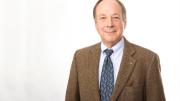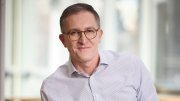Faculty of Arts and Sciences dean Michael D. Smith today announced that Harry R. Lewis, Gordon McKay professor of computer science and director of undergraduate studies for computer science, will serve as interim dean of the School of Engineering and Applied Sciences (SEAS), effective January 1. The need for an interim appointee arose following dean Cherry A. Murray’s announcement on October 28 that she would relinquish the post at the end of 2014. (Deans more often step down at the end of an academic year, and give substantial notice of their plans, making it possible for a search for a successor to be completed in time for a seamless transition, without the need for interim leadership.)
Lewis has plenty of administrative experience: he served as dean of Harvard College from 1995 to 2003. He has championed innovative teaching within his field (as described in his Harvard Magazine feature on “flipping” his classroom)—a focus of the school’s current strategic plan and capital-campaign fundraising. He is also a keeper of the school’s, and Harvard’s, history and values, writing on such diverse topics as the role of Gordon McKay, whose fortune supported applied sciences at the University—the forerunner of today’s SEAS—as noted in the name of Lewis’s own professorial title.
In his announcement, Dean Smith said:
Professor Lewis is a distinguished scholar in computer science, a Harvard College Professor for teaching excellence, and a highly experienced administrator and leader in the Harvard community. He brings to the deanship a thorough understanding of SEAS culture and academic life, exceptional insight into the undergraduate experience as a former dean of Harvard College, and the intellectual and administrative agility needed to effectively guide SEAS during this interim period.
The announcement notes that Lewis has “actively shaped undergraduate education and student life,” citing other formal service including participation on FAS’s Faculty Council, Educational Policy Committee, Committee on Undergraduate Education, the Administrative Board, the Committee on House Life, the Committee on Athletic Sports, and the Committee on Admissions and Financial Aid, among other assignments. He came to those roles steeped in Harvard, as a graduate of the College (1968) and the Graduate School of Arts and Sciences (Ph.D. 1974); he joined the faculty that year, and was promoted to tenure in 1981.
Lewis said in the statement:
I am honored to serve as interim dean of SEAS, where I first set foot as a freshman just over 50 years ago. The future of engineering at Harvard has never looked brighter than it does today. I hope to follow the model set by the SEAS faculty and staff from whose brilliance, wisdom, and kindness I have received such benefit over the decades.
SEAS itself is in a period of robust growth, with a burgeoning cohort of undergraduate concentrators, ambitious plans for the capital campaign (including University support for its new facility to be built in Allston), and an expanding faculty. That last goal received a significant boost on November 13, when former Microsoft CEO Steve Ballmer ’77 made a campaign gift that will underwrite a 50 percent expansion in the computer-science faculty.
Smith is conducting the search for a permanent dean, and disclosed that an advisory committee composed of faculty members from throughout SEAS has already been appointed. Members of the advisory committee are:
- Lene Hau, Mallinckrodt professor of physics and of applied physics
- Robert Howe, Lawrence professor of engineering
- Donald Ingber, Folkman professor of vascular biology and professor of bioengineering
- Efthimios Kaxiras, Van Vleck professor of pure and applied physics
- Jennifer Lewis, Wyss professor of biologically inspired engineering
- Marko Loncar, Lin professor of electrical engineering
- Vinothan Manoharan, Gordon McKay professor of chemical engineering and professor of physics
- David Parkes, professor of computer science
- John Shaw, Dudley professor of structural and economic geology and professor of environmental science and engineering
- Stuart Shieber, Welch professor of computer science
- Vahid Tarokh, Perkins professor of applied mathematics and Hayes senior research fellow of electrical engineering
- Salil Vadhan, Joseph professor of computer science and applied mathematics
- Steven Wofsy, Rotch professor of atmospheric and environmental ccience
- Todd Zickler, Danoff professor of electrical engineering and computer science
- Nina Zipser, Dean for Faculty Affairs and Planning, ex officio
- Jonathan Zittrain, Professor of computer science and Bemis professor of law
Murray’s successor will have a full agenda of fundraising; overseeing the creation of and relocation to the Allston complex (which will house about two-thirds of SEAS’s faculty, but separate them from their colleagues who remain in Cambridge); and leading the expansion of the school’s faculty generally while accommodating rising student demand for courses in computer science, bioengineering, electrical engineering, and other fields, in both the College and graduate schools.
Read the announcement here.









